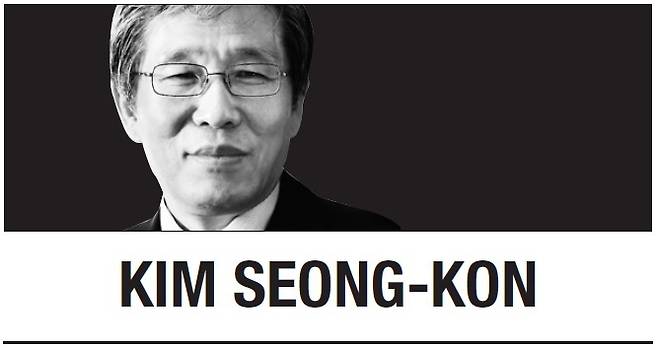[Kim Seong-kon] What will we reap 'Five Years Later'?
전체 맥락을 이해하기 위해서는 본문 보기를 권장합니다.
The preposterous tips continue: "She should prepare her husband's as well as her children's underwear, socks, shirts, handkerchiefs and outerwear."
The journalist reported that the "guidelines say women are responsible for household chores, cooking, and to sexually satisfy (their) husband(s)" during pregnancy. Most sinister of all is the following "warning": "A pregnant woman should consider that the risk of premature birth increases if the husband suddenly attacks the wife or engages in excessively violent sexual activity."
이 글자크기로 변경됩니다.
(예시) 가장 빠른 뉴스가 있고 다양한 정보, 쌍방향 소통이 숨쉬는 다음뉴스를 만나보세요. 다음뉴스는 국내외 주요이슈와 실시간 속보, 문화생활 및 다양한 분야의 뉴스를 입체적으로 전달하고 있습니다.

The city government of Seoul has recently come under fire for its “guidelines” for pregnant women who are preparing to give birth. The guidelines say that before going to the hospital, a pregnant woman should be sure to organize the refrigerator by taking out old food and filling it in with several new side dishes, such as instant curry, black bean sauce noodles and soups, for the sake of her husband, who is assumed to be uncomfortable with cooking.
The preposterous tips continue: “She should prepare her husband’s as well as her children’s underwear, socks, shirts, handkerchiefs and outerwear.”
Many foreigners have criticized these guidelines as an absurd anachronism. In his Twitter, for example, a foreign journalist wrote that these government “tips” were sexist and stereotyped.
The journalist reported that the “guidelines say women are responsible for household chores, cooking, and to sexually satisfy (their) husband(s)” during pregnancy. Most sinister of all is the following “warning”: “A pregnant woman should consider that the risk of premature birth increases if the husband suddenly attacks the wife or engages in excessively violent sexual activity.”
It is a shame that people with such a male chauvinist mindset still exist in our society and try to regulate our lives. The problem with our politicians is that they do not know the world has changed and are still living with 20th- or even 19th-century mindsets. Otherwise, they would not have posted such ridiculous tips on their website to address one of the most urgent and compelling issues in our society, the low birth rate.
Indeed, low childbirth has become a serious issue in South Korea lately. Newspaper reports point out that the current fertility rate is 0.9 babies per woman in her lifetime. Since many Korean women have jobs these days, they are reluctant to have babies because it is extremely difficult to work and raise a child at the same time. Besides, pregnant women have to face serious disadvantages at work in Korea. To make matters worse, many child care facilities are not trustworthy and good ones are hard to get into.
Another problem is that prejudice is common in Korean society against children from divorced families or interracial marriages. Many Koreans also have biases against single moms with children or children born from artificial pregnancy through sperm donation. Such a social atmosphere also discourages childbirth. Perhaps that is why many Korean women admire the Japanese television celebrity Sayuri Fujita’s courage to choose artificial pregnancy.
A few weeks ago, I came across an intriguing Korean novel entitled “Five Years Later” by Jeong Yeo-rang. The novel depicts a Utopian society in which the government encourages pregnancy and childbirth by taking care of everything from marriage to child care. In the novel, due to the dangerously low birthrate, the government implements an alternate marriage system called the “Five Year Marriage Law.” If a couple chooses the new law, their marriage will be valid for five years only. After that, they can either renew their marriage for another five years or terminate it freely. The government presumes that the new system will encourage women to have babies freely without binding them to wedlock, while benefitting from the government’s financial and systematic support for all the children from three to seven years old.
Under the new marriage system, people do not need to worry about having a baby or raising a child. A couple chooses to adopt a child and another couple decides to have a baby through sperm donation. When a high school teenage girl gets pregnant, the government takes care of her from A to Z. Of course, the new system has problems of its own. A couple terminates the marriage after five years because the husband’s parents attempt to force their daughter-in-law to choose a permanent marriage. Another couple gets a divorce even though they have a daughter because the wife refuses to give up her professional career despite pressure from her mother-in-law.
Jeong’s novel is a profound insight into our society, and a powerful criticism of our government’s indifference and incompetence to solve the problem. “Five Years Later” has a happy conclusion. Under the new system, couples can have babies freely and comfortably because the government provides everything for pregnant women and their children through the Reproduction Headquarters it has founded.
Nevertheless, reading this riveting utopian novel, the reader may find a resonance of Aldous Huxley’s “Brave New World,” in which the government controls childbirth. “Five Years Later” also resonates with George Orwell’s Big Brother who controls society and puts everyone under surveillance. In that sense, “Five Years Later” reminds us that a utopian welfare system may have its downsides. The title of the novel could also be an allusion to our political situation, suggesting that five years later after the presidential election, we will reap what we sow.
Kim Seong-kon
Kim Seong-kon is a professor emeritus of English at Seoul National University and a visiting scholar at Dartmouth College. -- Ed.
<ⓒKoreaHerald(www.koreaherald.com)무단전재 및 재배포 금지>
Copyright © 코리아헤럴드. 무단전재 및 재배포 금지.